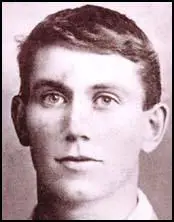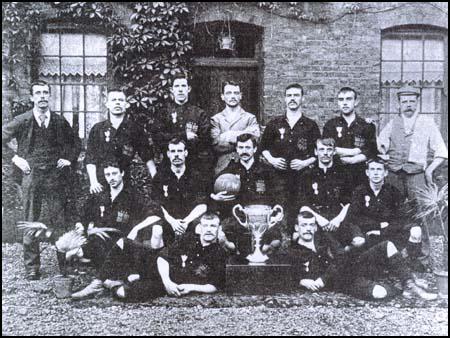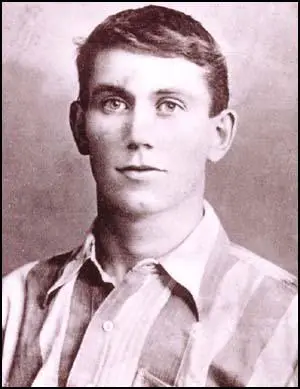William Barnes

William Barnes was born in London on 20th May, 1879. His father was a foreman at Victoria Dock and his mother had a coffee shop in Silvertown.
Barnes played for Thames Iron Works in the 1895-1896 season. The 17 year old scored the only goal in the deciding game of the West Ham Charity Cup.
In 1899 he signed for Sheffield United. The team had recently won the FA Cup and the First Division title and included players such as William Foulke, Ernest Needham, Walter Bennett and George Hedley.
Barnes struggled to get into the first-team. Sheffield United played Southampton in the 1902 FA Cup Final. Sheffield took an early lead but Southampton scored a controversial equalizer and the game was drawn 1-1. C. B. Fry wrote in the Southern Echo: "The outstanding feature of the match was the grand goalkeeping of Foulke. he made a number of good saves, and on two or three occasions cleared the ball from what appeared impossible positions. Once, near the end, from a corner, he effected an absolute miracle with four or five men right on to him."
William Foulke was furious that the equalizing goal had been given after the game he went searching for the referee. The linesman, J. T. Howcroft, described how Frederick Wall, secretary of the Football Association, tried to placate the goalkeeper: "Foulke was exasperated by the goal and claimed it was in his birthday suit outside the dressing room, and I saw F. J. Wall, secretary of the FA, pleading with him to rejoin his colleagues. But Bill was out for blood, and I shouted to Mr. Kirkham to lock his cubicle door. He didn't need telling twice. But what a sight! The thing I'll never forget is Foulke, so tremendous in size, striding along the corridor, without a stitch of clothing."
Walter Bennett was injured and could not take part in the replay. He was replaced by the William Barnes on the wing. The game was only two minutes old when a massive clearing kick by William Foulke reached Jack Hedley and Sheffield United took an early lead. Led by the outstanding Ernest Needham, Sheffield dominated play but Albert Brown managed to score a equalizer. Southampton began to apply pressure but according to the Athletic News, "Foulke was invincible". With ten minutes to go, Needham took a shot that the Southampton goalkeeper, John Robinson, could only block, and Barnes was able to hit the ball into the unguarded net. Sheffield won 2-1 and Barnes won a cup-winners' medal.
After scoring six goals in 23 games for Sheffield United before Barnes joined West Ham United at the beginning of the 1902-3 season. Barnes scored in his debut against Reading. Barnes scored only three more goals that season. However, he still ended up the second highest scorer behind Billy Grassam who scored 19 that year.
The following year Barnes managed only one goal in 25 games. In 1904 Barnes moved to Luton Town. Later he played for Queens Park Rangers. After retiring from playing Barnes was a coach with the Spanish club Bilbao.
William Barnes, was the brother of Alfred Barnes, the Labour Party MP for East Ham who served in the government of Clement Attlee as Minister of Transport (1945-51).
William Barnes died in 1962.

row (left to right): Arnold Hills, French, Graham, Francis Payne, John Woods, Hickman
and Tom Robinson (trainer). Centre; Chamberlain, George Sage, Robert Stevenson,
William Chapman, William Barnes. Front; Johnny Stewart, Thomas Freeman.

